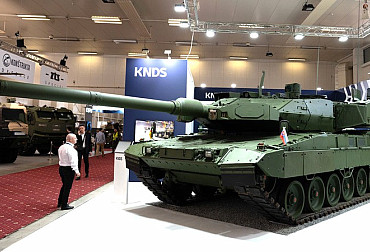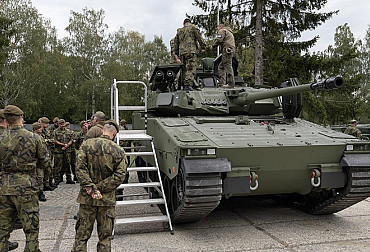The Command Assembly of the Czech Armed Forces discussed coronavirus, tenders and the deployment of our Armed Forces on the Polish-Belarusian border
The Army's vision for 2022, an assessment of this year and thanks to the outgoing Minister of Defence. This was the opening of the traditional Commanders' Assembly of the Chief of the General Staff of the Army of the Czech Republic, General Aleš Opata. This year's Assembly, like last year's, was marked by measures against the coronavirus pandemic and therefore took place in two parallel locations - Prague and Olomouc. Another change from last year was the absence of the Commander-in-Chief of the Czech Army, President Miloš Zeman, who is recovering in the Central Military Hospital in Prague. Prime Minister Andrej Babiš was also absent. He is in Budapest for a meeting of the V4 countries called by Polish Prime Minister Mateusz Morawiecki because of the current situation on the Polish-Belarusian border. However, the outgoing defence minister Lubomír Metnar, the Chief of the General Staff of the Czech Armed Forces, General Ales Opata, including other representatives of the Czech Armed Forces Command, and other guests were not absent from the meeting.
 Picture: Outgoing Defence Minister Lubomír Metnar (left) and Chief of the General Staff of the Czech Armed Forces General Aleš Opata | Ministry of Defence of the Czech Republic
Picture: Outgoing Defence Minister Lubomír Metnar (left) and Chief of the General Staff of the Czech Armed Forces General Aleš Opata | Ministry of Defence of the Czech Republic
In his opening speech, General Opata first thanked our soldiers who face new challenges and threats and thus pull the Army forward in terms of quality. He equally appreciated the work of the outgoing Minister Metnar in trying to address and implement the military contracts and expressed his hope that the plan of 2% of GDP expenditure as planned by the new coalition government will be achieved. "We have had another year with the pandemic. Covid has tested our deployment, endurance, adaptability and rapid response. We have ended a 20-year mission in Afghanistan. Now we need to focus on our main job, and that is to prepare for defence," the Chief of Defence Staff assessed the end of 2021.
 Picture: Representatives of the command of the Czech Armed Forces at the Command Assembly of the Czech Armed Forces | Ministry of Defence of the Czech Republic
Picture: Representatives of the command of the Czech Armed Forces at the Command Assembly of the Czech Armed Forces | Ministry of Defence of the Czech Republic
Opata cited training as a key readiness moment, which, despite all the covide obstacles, needs to be caught up as soon as possible. Regarding the modernisation of armaments, General Opata recalled the developments since 2018 and the fact that, apart from the acquisition of new IFVs, other objectives have been met. He recalled the laying of the foundation of the Cyber and Information Forces, the Support Battalion, the Unmanned Systems Battalion and the Airborne Regiment. "The rearmament of the Army must not only not stop but must accelerate," General Opata added. Opata said the future of the development of the Army's capabilities lies in technology, artificial intelligence, unmanned vehicles, laser-guided munitions and robotics. "You can see for yourself that the lines are blurring between peace and conflict, between politics and warfare, between the strategic and the tactical, the kinetic and the non-kinetic," Opata continued.
General Opata identified the 'NATO Warfighting Capstone Concept (NWCC)' and the 'Concept for Deterrence and Defence in the Euro-Atlantic Area' as key documents for capability development. For the military, this implies the need to bridge the traditional and virtual domains. "We need to be able to move in information and cyber space as sovereignly as on the ground or in the air. We will not gain superiority over any adversary if we do not have a coordinated strategy in all operational domains," General Opata said, among others.
Defence Minister Lubomír Metnar focused his address on an assessment of his four-year tenure as head of the ministry. This, he said, was unprecedentedly affected by the COVID-19 pandemic, which is still being fought and the army is on the front line.
Another important point, the minister said, was the rise in expenditure on running the ministry from 59 billion in 2018 to over 85 billion this year. This is also reflected in the overall growth rate of investment across the 30 NATO nations. Here we are currently in seventh place.
The minister said another important moment in his four-year tenure was the restart of the acquisition of new weapons and equipment. "Since my arrival at the Ministry, 42,000 contracts worth CZK 150 billion have been concluded across the Ministry. Thanks to this, soldiers are getting the modern equipment and equipment they desperately need. Two of the most important purchases we have managed to complete recently. These are French NATO calibre guns and Israeli SHORAD anti-aircraft system," Metnar said. Another important milestone is the fact that 97% of the concluded contracts have been implemented with domestic suppliers. "Thus, investments in defence are positively reflected in GDP growth, tax collection and employment," the minister added.
Another significant moment, according to Metnar, was the establishment of three new commands - the Operations Command, the Territorial Command and the Cyber Forces and Information Operations Command - and the creation of the Agency for Intergovernmental Defence Cooperation (AMOS) within the ministry, which has the primary task of supporting the sale of military equipment at the intergovernmental level.
At the end of his speech, Minister Metnar thanked for cooperation and announced that he was not actually saying goodbye. "As a Member of Parliament, I will continue to focus on security issues and I believe that I will have the opportunity to meet many of you in the future," the Minister concluded his speech.
In response to questions from journalists, General Opata and Minister Metnar, among other things, clarified that more than 230 soldiers are now working in 53 hospitals to deal with the current next wave of the pandemic. Their resilience is then ensured by more than 85 per cent vaccination coverage. The possible compulsory vaccination, has already taken place in some units and therefore, according to General Opata, it is only a matter of finishing things.
Asked about the slowdown in the tender for the new IFVs, Opata said it was unfortunate but the project was not stopped. The Army is ready to allocate the necessary capacity for the new administration to speed up the process. The key purchases under the Army's Construction Concept for 2022 are then the aforementioned IFVs, technological changes in the software category and other changes related to cyber forces, and preparation for the implementation of the new equipment that has been purchased, including training of soldiers.
On behalf of CZ Defence, we have asked a question in connection with the V4 meeting in Budapest about the possible deployment of our Armed Forces in resolving the crisis on the Polish-Belarusian border, if Poland requests it. Minister Metnar said the following: "We have already offered assistance to the Polish side, not only in the form of police officers, but also material assistance, and we have not yet received any feedback from the Polish side. We are ready to help Poland. Regarding the deployment of troops, a mandate must be approved by both houses of Parliament. Without that, we cannot implement any possible participation of our soldiers."





















